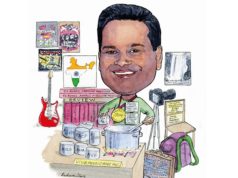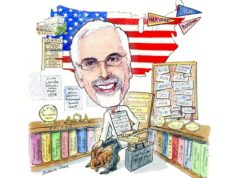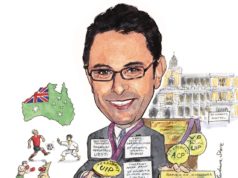
Armando Mansilha is professor of Angiology and Vascular Surgery, Faculty of Medicine at the University of Porto, Porto, Portugal. In this interview with Venous News, he speaks about his early work and mentors, the biggest developments in venous medicine over the course of his career, and what he sees as the main challenges in the management of venous thromboembolic disease.
Why did you decide you wanted a career in medicine, and why in particular did you choose to enter the vascular and venous fields?
I am not sure when my interest in medicine was born but in my early teenage years this attraction for a medical career, and specifically for surgery, was already very clear to me. And this happened even though I come from a non-medical family—my father being a lawyer and my mother a French teacher. My interest in vascular surgery came at the end of university and during the period as a general training practitioner. The main reason for my choice was, at that time, the opportunity to deal with arterial, venous and lymphatic disorders, both medically and surgically, electively and in an emergency setting. Also dealing with invasive and non-invasive imaging, with technics, a large field for research, and the possibility to teach at university were key points in this early interest.
Who have been your most important career mentors and what wisdom did they impart?
I had the privilege to be in contact with many distinguished physicians, researchers and professors in my career, which makes it difficult and even unfair to list only a few. I started to learn the principles of research and monitoring of anatomy classes during the fifth year of university with the future patroness of my graduation year, who currently is the director of the Faculty of Medicine of Porto: Maria Amélia Ferreira. My strongest influence during my training period and even afterwards, as consultant of angiology and vascular surgery, was my PhD mentor, António Braga, who taught me the most important attributes of a surgeon, including clinical judgement, technical skills and ethical principles. I was fortunate to meet and spend time with Joaquim Barbosa, the first secretary general of the Portuguese Society of Angiology and Vascular Surgery (SPACV) and later president, with me as secretary general, which was a tremendous motivator in all my national and international career, and the great driver of many of my involvements and commitments with the SPACV, the European Union of Medical Specialists (UEMS), the International Union of Phlebology (UIP) and the European Society for Vascular Sugery (ESVS).
In the venous world, my references were, and still are, Andrew Nicolaides and Michel Perrin for their scientific rigor and at the same time the “outside of the box” thinking, which resulted in original research projects and publications that generated guidelines and recommendations for best practice. In Portugal, my reference was Paulo Correia, with whom I learned the most important principles of phlebology by working alongside him every week for more than 10 years.
What have been the biggest developments in venous medicine during the course of your career?
The biggest developments have been the endovascular revolution with the introduction of venous stents and the catheter-based interventional techniques. Furthermore, the advancement of imaging methods, namely duplex ultrasound for clinical investigation, surgical mapping and endovenous treatments.
Recently the introduction of the new oral anticoagulants (DOACs/NOACs) completely changed the paradigm of medical treatment of venous thromboembolic disease.
What is the most interesting paper or presentation that you have seen recently?
Because of my international positions I travel extensively to vascular meetings so it is difficult to identify only one paper or presentation amongst so many outstanding contributions.
Recently, and specifically related with venous disease management, I would highlight the importance of the consensus decision pathway on management of bleeding in patients on oral anticoagulants. Next year, the update of the European Venous Forum (EVF) guidelines on chronic venous disease will be published. It is important to applaud recent contributions from different areas in the world, with publications in languages other than English that, for this reason, go largely unnoticed by the journals with the highest impact factors.
What are your current research interests?
I am the national coordinator of three international research projects: RE-COVERY, WHITE and VOYAGER PAD. At a national level, I am the coordinator of the REVEAL-CEAP, the largest epidemiological study on chronic venous disease, using the CEAP classification, performed at primary healthcare. Moreover, I am tutoring PhD students in the field of abdominal aortic aneurysm, carotid pathology, varicose veins and diabetic foot. I am also truly engaged with the project ESVS CAMES Needs Assessment in the field of medical education and simulation.
How have new technology and thinking evolved our approach to venous thromboembolic disease? What challenges still remain in this area?
I would classify the recent advances in our knowledge and approach to venous thromboembolic disease as a revolution! It includes the introduction of venous stents, the pharmacomechanical devices and medical treatment with the new oral anticoagulants. But there is still a long way to go in the endovenous treatment of distal femoral lesions, the use of DOACs in oncology as well as during pregnancy or for patients with SAF, aggressive prophylaxis in patients with known risk factors for venous thromboembolism (VTE), and the duration of anticoagulation for the majority of patients considering this is a chronic disease.
You are currently the Secretary General of the UEMS Section and Board of Vascular Surgery—how does the Society approach training and certification?
The UEMS was created in 1958, and since the foundation the main objectives are to promote the highest level of patient care in the European Union (EU), to promote the harmonisation of high-quality training programmes within the various specialities throughout the EU and to facilitate the free exchange of training and work of trainees and medical specialists between the various member countries.
Since 2004, the Section of Vascular Surgery is independent and separate, and according to the statutes of the UEMS Section and Board of Vascular Surgery: “The main objective is to guarantee the highest standards of care in the field of the vascular surgery in the countries of the EU, by ensuring that the training of the specialist doctor is raised to the highest possible level”.
Currently the European specialist qualification in any speciality, including vascular surgery, does not replace the accreditation by the national authorities, which is the primary specialist accreditation recognised by law by all member countries. Thus, the European qualification, entitling those who pass the examination as Fellow of the European Board of Vascular Surgery (FEBVS), must be seen as a respected qualification and a European quality mark.
How has the training curriculum changed to cover the modern endovascular technology being introduced?
There are still large differences in requirements and length of training in vascular surgery within the EU concerning the minimum training required which ranges from five to nine years. Other types of differences remain in the programme accreditation, trainee certification—including national association, speciality society, government, university, speciality board, general medical council—and the national exit examinations required.
Therefore, this stresses the importance of harmonisation in training and certification in vascular surgery within the EU. This is even more important for endovascular technology as in some countries the vascular trainees face several difficulties to learn and train the endovascular skills in an independent way. For this reason, it is important to have training requirements approved by the council and accepted by the national authorities.
What achievements are you proud of during your time as President of the EVF?
At the European Venous Forum Annual Meeting (29 June–1 July 2017, Porto, Portugal), the centrepiece of our daily sessions were the peer-reviewed presentations (34 oral and 52 electronic) selected from the best of the submitted abstracts from 32 countries. The number of registrations and participants—more than 850—was the highest in the history of the Society. I would like to highlight the didactic sessions on different topics and the quality of the panel of expert international speakers. A great achievement that I am very proud of was to have the presence of the most representative delegates from different international societies (AVF, ACP, JSP, ESVS, UIP, LAVF, SPACV) and their participation at the scientific programme. Last but not least, the Glossary for Phlebology was approved in Porto and the printed document will be distributed in 2018.
You are also the chairman of the Porto Vascular Conference. What will the highlights for 2018 be?
For this two-day conference (18–19 May) we expect more than 700 participants. The scientific programme includes specific sessions for vascular specialists and trainees as well as for vascular nurses, technicians and GPs. At the same time, two workshops per period will be devoted to different techniques, endovascular and open, but also to venoactive drugs, DOACs, elastic stockings and sclerotherapy. Two specific sessions will be dedicated specifically to anticoagulation in different pathologies with a multidisciplinary approach. A great moment of the conference is always the awards ceremony for the best e-posters of last year’s University of Porto medical students. This year we will also give prizes to the best GP clinical cases in the vascular field and the best European Vascular Surgeons in Training
(EVST) clinical cases. A book of articles related to the presentations will be published and distributed to the participants.
What are some of the proudest moments in your career?
In my clinical and academic career I had several moments of great significance that would certainly include successfully entering the Faculty of Medicine at the University of Porto in 1986, the year with the lowest ever number of students, only 40 in my Medical School; when I chose, in 1994, the speciality of angiology and vascular surgery, after a national examination which gave me the opportunity to be resident in the Hospital S João; in 2000, when I won my first international research grant, awarded by the International Society for CardioVascular Surgery, due to my work on genetic polymorphisms and deep venous thrombosis in younger patients; when I obtained the title of FEBVS in 2002, during the ESVS annual meeting in Istanbul; when I made my PhD in Angiology and Vascular Surgery and obtained the title of Professor in my university, in 2005, on the same day as my son’s fifth birthday.
Other proud moments in my career, in a different perspective, were when I was elected Secretary-General of the Portuguese Society of Angiology and Vascular Surgery in 2008, Secretary-General of the UEMS Section and Board of Vascular Surgery in 2009 and President of the European Venous Forum in 2016.
What three questions in venous medicine still need to be answered?
- Understanding in detail the cellular mechanisms and biomechanical forces related with the chronic venous disease and how to make recommendations for primary prevention;
- Endoapproach to recanalise the popliteal and femoral segments, without reflux, to ameliorate symptoms after an episode of deep venous thrombosis and prevent a late post-thrombotic syndrome;
- Classification of detailed anatomical patterns of varicose veins to establish the best strategy and interventional technique.
What advice would you give to young surgeons starting out in their careers?
They must be prepared to be exposed to different approaches to treat vascular patients. In fact, fellowships in different departments and with different targets are of great importance. Training has to include open and endovascular techniques. Sharing ideas and working with colleagues is beneficial for trainees and specially to patients. Young surgeons should continue to expect and embrace continuous changes, promote research even thinking in an original manner. Nothing will be easy to achieve and they will have to work hard.
What are your interests outside of medicine?
First of all, I like to spend time with my family. Travelling around the world, exploring wonderful places, meeting different cultures and local people are passions of mine. I have one list with a lot of possible destinations to visit and discover and this grows every year.
Sport, and particularly outdoor activities including tennis, sailing and skiing, play an important role in relaxing during holidays. Usually, I try to attend the football matches of my favourite team, FC Porto, namely at the “mythical” dragon stadium! In addition to all these hobbies and interests, I have to include cinema, fashion, arts and museums and especially music. Jazz and classic are
the most often heard styles in my daily playlist.
Fact file
Education (selected)
1986 – Medical Student, Faculty of Medicine of University of Porto, Portugal
1995 – Resident, Department of Angiology
and Vascular Surgery, Hospital S João, Porto Certification
2001 – Specialist in Angiology and Vascular Surgery, Portuguese Medical Association
2002 – Fellow of the European Board of Vascular Surgery, UEMS
2005 – PhD in Angiology and Vascular Surgery, Faculty of Medicine of University of Porto
Appointments (selected)
2001 – Consultant, Department of Angiology and Vascular Surgery, Hospital S João Porto
2005 – Professor of Angiology and Vascular Surgery, Faculty of Medicine of University of Porto
2010 – Director, Department of Angiology and Vascular Surgery, Hospital CUF Porto
2016 – Associate Professor of Angiology and Vascular Surgery, Faculty of Medicine of University of Porto
Positions (selected)
2005 – Council Member, Union International de Phlébologie
2006 – Executive Committee, College of Angiology and Vascular Surgery, Portuguese Medical Association
2008 – Secretary-General, Portuguese Society of Angiology and Vascular Surgery
2009 – Secretary-General, UEMS Section and Board of Vascular Surgery
2009 – Council Member, European Society for Vascular Surgery
2013 – Council Member, Mediterranean League of Angiology and Vascular Surgery
2013 – Honorary Member, The Vascular Society for Great Britain and Ireland
2014 – Council Member, International Union of Angiology
2015 – President of the LOC Annual Meeting, European Society for Vascular Surgery
2016 – President, European Venous Forum
2016 – Vice President, Portuguese Society of Angiology and Vascular Surgery
2017 – Moynihan Club Member
2017 – Honorary Member, Societat Catalana d’Angiologia, Cirurgia Vascular I Endovascular









